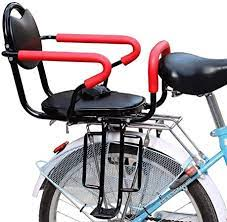[details=“English Translation”]I can’t fix the seat.[/details] I can’t see that “fissare” ever means “to repair.” Does it? I realize that one might possibly say that they can’t fasten down the seat in one immovable position, but that’s really a stretch. If “fissare” never means repair, this sentence is a disservice to people learning the language because that’s what they will think it means.
Indeed, it could match “affix”, in the sense that you mention “I couldn’t affix [secure in a stable position] the seat”, but not sure that was the intention of the sentence.
Non è problematico se si pensa a un sedile posteriore di bicicletta.

My translator gives me “fissare - to secure, fix, set, attach, fasten”. I have certainly used fissare like this. I don’t think the translation is talking about repairing, as far as I can see, just fixing.
Perhaps I’m too sensitive about this issue, but these kinds of sentences irritate me inasmuch as they are misleading to beginners, and the point of this app is to learn. There is a sentence about collecting stamps and the cloze word is “timbri,” which is something no one collects. There is a sentence that refers to playing outside where the cloze is “suonando.” Just because a sentence is plausible if you torture the scenario doesn’t mean it qualifies as a good sentence to use for teaching purposes. I just came across this sentence: “Mi è stato chiesto di fissare la bicicletta.” Any beginner could rightly assume that “fissare” can mean “repair” and go out and use it that way. I’m not saying the sentence is incorrect, but that it’s irresponsible to put it in a teaching app.
I think you are right; according to my experiences here in my native tongue, German, these things happen.
As I understand it, it is a result of the direct coupling of clozemaster to Tatoeba without some sort of rigid quality control in between.
However, the advantage of this coupling is the stunning amount of sentences that we have here.
It is probably unrealistic to ask for high quality and high quantity at the same time.
Since we have the links to outside resources like Treccani and this forum - I never miss an opportunity to thank the fellow users for all their help ![]() - I can live with that and use clozemaster’s quantity for the “massive immersion” strategy.
- I can live with that and use clozemaster’s quantity for the “massive immersion” strategy.
That said, for absolute beginners clozemaster is not the right starting point.
MRgK. You put it well. Cloze is very much for those more advanced. I love the variety it gives and if I find a word or phrase that I feel is wrong, it can be discussed here as a way of learning. I haven’t yet found a site that is perfect though I’m very glad I found this one.
Cordiali saluti!
For the fun of it, I have asked…
- Google Bard:
“Yes, “fissare” can mean to repair something. For example, “Devo fissare il mio orologio” means “I have to repair my watch.” However, it is important to note that “fissare” can also have other meanings, such as to fasten, establish, or set something. So, it is always best to check the context in which the word is used to determine its meaning.”
- GPT-4
"In most contexts, “fissare” in Italian does not mean “to repair.” However, language can be flexible, and in some informal or colloquial situations, people might use “fissare” to imply “to repair” or “to fix” something, especially if the context makes it clear what they mean. Nonetheless, the more accurate and common Italian word for “to repair” is “riparare.”